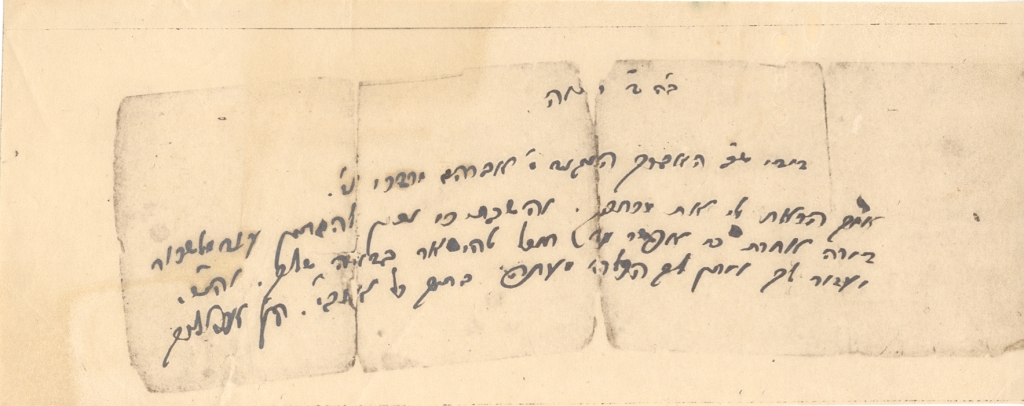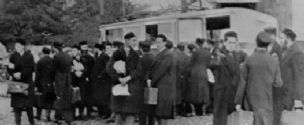In All Their Trouble, He Did Not Trouble Them (Isaiah 63:9)
120 years since the outbreak of the Russo-Japanese War; 119 years since the passing of the Sfat Emet
By: Yaakov Rosenfeld, Ganzach Kiddush Hashem
The 5th of Shvat marks the yahrzeit (anniversary of death) of Rabbi Yehuda Aryeh Leib Alter z”l of Ger, known as the Sfat Emet.

Handwriting of the Sfat Emet of Ger
The Gerrer Rebbe, leader of Polish Jewry and the rabbi and luminary of thousands of chassidim, died in the midst of the Russo-Japanese War, the bloody war that resulted in the death of thousands of Jewish soldiers who had been recruited against their will.
The Russo-Japanese war stunned the world, which watched the failures of the great and powerful Russia against Japan, which was much more backward.
The Jewish tragedy of this terrible war has almost been forgotten due to the two world wars that took place just a few years later. The terrible Holocaust that destroyed European Jewry cast a thick shadow over everything that preceded it, but in truth, this war that broke out at the beginning of 1904, 120 years ago, was an indirect, but significant factor in the outbreak of the First World War and the Bolshevik Revolution. In Asia, Japanese imperialism developed as a result, which led to a conflict with the United States, and indirectly to the liberation of the peoples of the region from the yoke of western colonialism.
The Rebbe had thousands of young men recruited amongst his followers; his heart was broken to pieces with grief for his students, who were like sons, and with concern for their safety.

Chassidim disembark the “koleikeh” (electric train) upon arrival to the villager of Gur (Gora Kolwaria)
The last year of his life passed entirely in the shadow of the terrible war. With narrowed eyes, his family members and close associates followed his difficult mental state which manifested itself mainly at night, in which he did not get up from his bed but lay on the ground with a thin coat over his body, and would bitterly cry.
He was a faithful shepherd, a loving father to thousands of followers, who were connected to him in heart and soul and there was eternal love between them. His tender heart could not bear their sorrow, and on the fifth of Shvat 5665, about a year after the outbreak of the war, he passed away at only 58 years old.
About twenty thousand chassidim attended his funeral, and as is customary for chassidim, there were no obituaries, except for a short sentence which was announced by Rabbi Avraham Bornstein of Sochaczew, known as the “Avnei Nezer”:
“The righteous one is lost and no one pays attention, because the righteous one is gathered from evil.”
Many evils befell the Jewish People during the years after the Sfat Emet’s passing; wars, decrees, poverty, the hardship of enslavement, and the tragic deterioration of educational values among the Jewish youth all over Europe, but none of those who heard the short obituary of the Avnei Nezer could imagine what fate awaited them and their descendants in a little more than thirty years; what “evil” the Jewish People would face in the years of rage and extinction, “years in which we saw evil”, the darkest years in all of Jewish history.

The study hall of the Ger chassidim in Poland (on the left) and next to it, the home of the Rebbe
I Call Upon Today as Witnesses– Story
In the last year of the life of the Gerre Rebbe, the Sfat Emet, the Russo-Japanese War broke out, and thousands of his followers were taken to the army, those who were of conscription age, and were sent to battlefields in the Far East. The Rebbe would bless his chassidim before they went on their long journey by saying: “What man is there who is fearful and fainthearted? Let him go and return” (Deuteronomy 20:8) – anyone who fears Heaven should go and then return, thus he is guaranteed to return home from the war. And great was the Rebbe’s anxiety for the fate of the soldiers. All the days that his followers were at the front, he did not get into bed, and he would lie on the floor, with only his robe under him, and the robe was all wet from his tears that he shed over the pain of the Jewish People.
And his followers were also loyal to him and would write Torah thoughts to him from the front, from the trenches, and would tell him in their letters what was happening to them. And one student, a prodigy, from the city of Ostrowiec, wrote a long letter about Rabbi Yona to him from the trenches. The Sfat Emet answered him, and he opened his letter with these words: “‘I call upon the Heavens and earth today to testify’ (Deuteronomy 30:19), I have testified, and want to say: I have decorated the Heavens and the earth with you, with such Jews.”
(Rabbi Shlomo Yosef Zevin, Sipurei Chassidim, Torah, Part 2, Jerusalem 5762, page 325)












